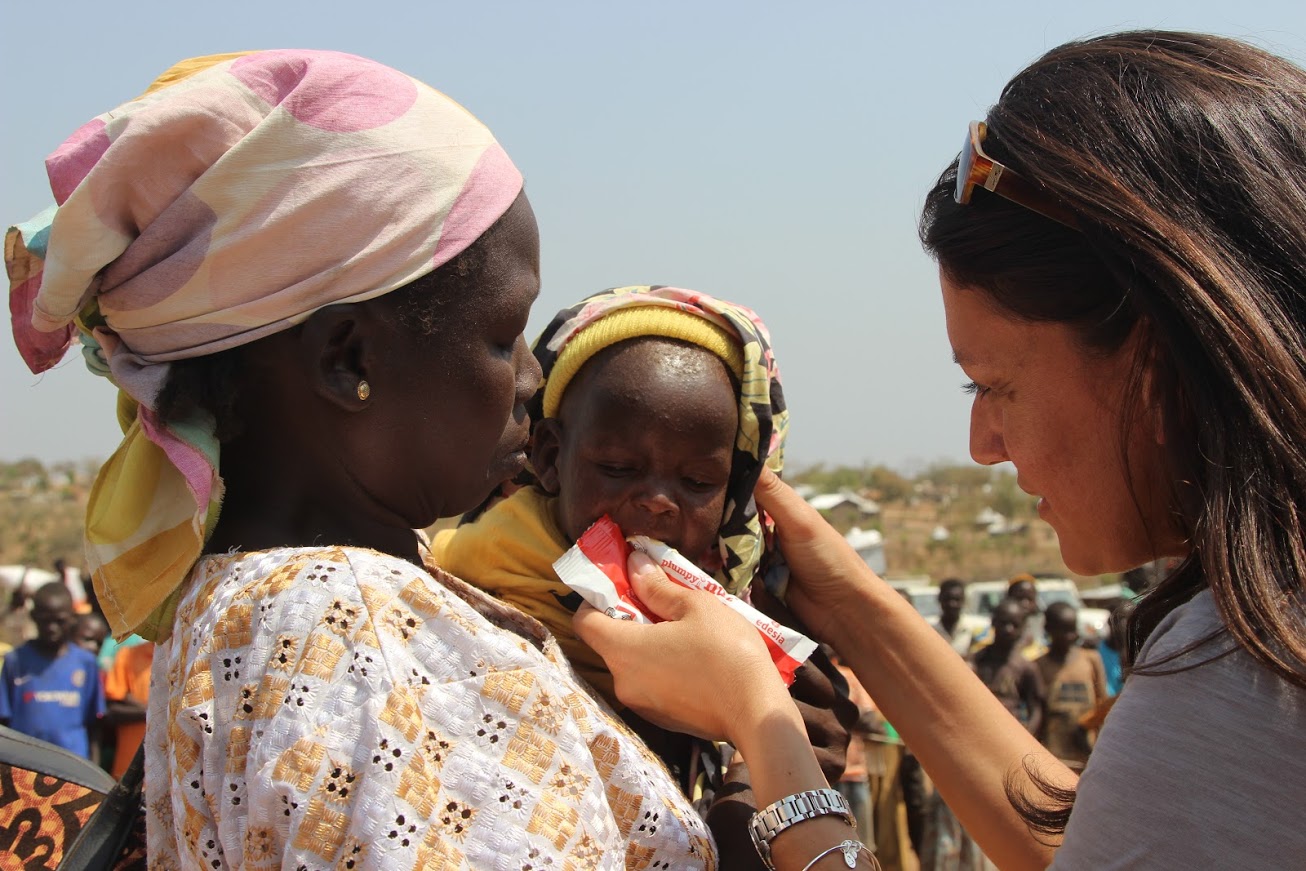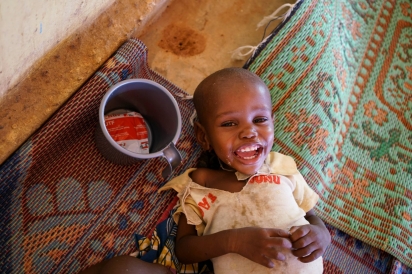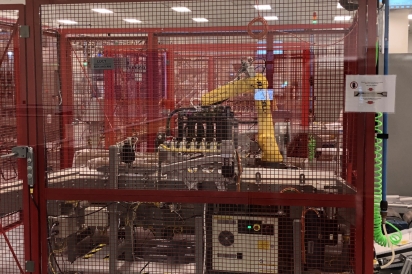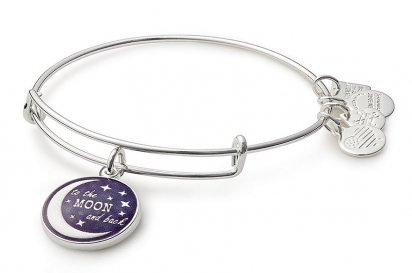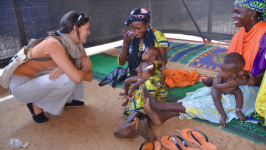A Conversation with Navyn Salem, Founder and CEO of Edesia
In 2009, Rhode Islander Navyn Salem founded Edesia Nutrition, a nonprofit company based in North Kingstown. She holds a business degree in media and communications from Boston College and her father is from Tanzania, which like many African nations suffers from lower life expectancy and higher death rates than the global average. Because of Salem’s ties to the African continent, her education and her compassion, she was inspired to create a U.S.–based company to address childhood malnutrition. Her love of children (Salem is a mother of four) combined with a desire to end world hunger by solving problems through business also prompted her to start Edesia.
In mid-January 2018, Salem visited the largest refugee camp in the world, located at the border of Uganda and South Sudan. Edible Rhody recently met up with Salem to talk about the rapid growth of Edesia, its mission and its recent developments.
What are Edesia’s mission and goals for the future?
Edesia’s mission is to help treat and prevent malnutrition in the world’s most vulnerable populations. Edesia’s goal is to reach 10 million children by 2020.
Please explain the products Edesia makes and the populations that are aided by those products.
Edesia makes products such as Enov’Nutributter and Plumpy’Nut, both of which are shelf stable and ready-to-use supplementary and therapeutic foods, respectively.
Enov’Nutributter is used for prevention of malnourishment in children between 6 and 24 months of age. The goal of Enov’Nutributter is to provide essential vitamins and minerals while they are young and still healthy. Edesia also makes preventive products such as Plumpy’Doz, which can be used by both children and by mothers who are pregnant or nursing.
Plumpy’Nut is used to treat severe acute malnutrition in children who are struggling to survive. Plumpy’Nut is designed for children between 6 months and 5 years. Each product is distributed to countries depending on the current crisis. Many African countries are aided by these products. Countries such as Syria, Haiti and Yemen have also benefited from the nutrition products produced by Edesia.
Since its inception, to how many countries has Edesia sent its food products?
Edesia has shipped its products to approximately 50 countries worldwide.
What are the products made from? And are your products the same for every country? Do they differ per age group?
The products are made from a mixture of peanuts, milk powder, sugar, vegetable oil and fortified vitamins. Depending on where it is distributed and age group, Edesia’s products vary but none are drastically different.
How does the distribution process work?
Organizations such as UNICEF, World Food Programme (WFP) and government agencies help determine where the products are needed most and they handle the distribution process to get Edesia products to those most in need.
Moving from Providence to a larger production facility in North Kingstown must have helped to increase the amount of products you produce. Has that increased your footprint worldwide?
After moving to a larger production facility, Edesia was able to reach 40% more individuals in just one year. In 2016, we reached about 1 million individuals; in 2017 we were able to reach 1.4 million individuals.
Being able to respond quickly is very important. The new facility helps us be more efficient, lower cost and produce more with the same amount money.
Has moving to a larger facility expanded the number of people you employ here in Rhode Island?
We currently have the same number of employees (65 employees, representing 20 different countries). However, since only one-third of our finished product can be held on site, local employment has expanded externally through other Rhode Island–based companies with whom we work to increase storage and to purchase necessary packaging and so forth.
Is Edesia developing food products aside from those it produces for the malnourished? If so, what is the approach for developing products for commercial use?
Edesia is currently launching its first domestic product: Little Nut. Little Nut is a nutritionally dense and convenient nut butter blend for children 6 months and up. It provides 3 grams of total protein, 2.5 grams coming from peanuts alone. Just three of these packets a week is about the amount needed to help reduce a child's risk of developing a peanut allergy. This concept was adopted based on the American Academy of Pediatrics recommendation to introduce a peanut-based product at 6 months of age in order to help reduce the risk of children developing peanut allergies. The issue with traditional peanut butter is its thick consistency, which children may struggle to swallow. Little Nut utilizes a mixture of peanuts, coconut and fruit powder to provide a delicious snack that smoothens texture and reduces stickiness without the need to dilute the consistency of regular peanut butter.
Little Nut can be consumed straight from the packet or incorporated within fruit purées, vegetables and other foods in a child’s regular diet.
Along with providing a nutritious product for children, 100% of proceeds supports Edesia’s mission to treat and prevent malnutrition.
Why Rhode Island?
Mainly because I live in Rhode Island and am raising my four children here. At the time of Edesia’s inception the need for job creation was important in Rhode Island. Edesia was able to create jobs both internally and externally, which was a great benefit to the Rhode Island community.
What is Lucy?
Lucy is a mechanical packaging machine, installed in early September. One-third of nut-based products made by Edesia are packaged using Lucy. That translates to enough products for just under half-million children per year. Lucy was funded through the ALEX AND ANI Charity by Design program. For every specially designed Stellar Love bangle charm made and sold by the Rhode Island jewelry company, 20% is donated to Edesia.
How many donations does Edesia receive from companies like ALEX AND ANI?
Aside from ALEX AND ANI, Edesia receives donations from This Bar Saves Lives. For every [granola snack] bar purchased, food aid is distributed to a child in need. This form of donation helps spread the word regarding malnutrition, as well as contribute to the cost of getting the packets to countries in need.
###
The company’s aspirations will keep them busy for the next three years. With its current growth, Edesia is definitely on track to reach its goal to reach 10 million children by 2020. Since the issues surrounding childhood malnutrition and the plight of refugees worldwide show no sign of abating, it is unlikely Edesia will see a decrease in need for their products


